Fatty Liver Part 2: How to Treat Fatty Liver Naturally?
Healthy eating, exercise, and other recommendations to help you prevent and improve fatty liver conditions
 (Photo: shutterstock)
(Photo: shutterstock)Fatty liver, overweight, and diabetes are part of a set of diseases collectively known as "insulin resistance syndrome".
In insulin resistance, which is typical of overweight and diabetes, the body cells do not respond to the normal amount of insulin that the body secretes, as happens in normal functioning, resulting in increased sugar and fat levels in the blood. Excess fats from the blood reach the liver and accumulate there.
The main treatment focuses on prevention, namely losing weight, reducing blood fat levels, balancing existing diabetes, or preventing diabetes.
Most people look for magic solutions, want to buy a liver cleansing formula, and are not ready to address the root and adopt a healthy lifestyle. Although there are excellent formulas, if we continue to introduce toxins, it is difficult for the body to filter out all the toxins and fats.
Think of the body as your bank account. If you deposit 100 ₪ each day but withdraw 500 ₪ daily, will the account be in credit or debit?
Dietary Recommendations
Eat more green vegetables, root vegetables, and cruciferous vegetables: cabbage, cauliflower, broccoli, turnip, radish, Brussels sprouts, watercress, kohlrabi, mustard, artichoke, green beans, broccoli, asparagus, zucchini, spinach, rocket leaves, sprouts, celery, parsley, coriander, dill, mint, lettuce. If you are taking blood thinners, consult a doctor before increasing your green food intake.
Dietary fibers - consume foods rich in fibers. These fibers bind substances we want to remove from the body. The fibers help and facilitate regular bowel movements. During constipation, some toxins may be reabsorbed back into the body. Recommended foods are legumes, such as lentils of all colors, mung beans, root vegetables, apples, pears, melon, almonds, and avocado. Additionally, wheat bran, oat bran, and psyllium husks can be incorporated into the diet.
Spices: turmeric, nettle, dandelion, ginger, caraway, rosemary, cardamom, fennel, fennel seeds.
Turmeric - it is used for a variety of digestive, respiratory, cardiovascular, skeletal and joint problems, skin, urinary issues, and metabolic disorders related to liver and gall bladder cleansing. Turmeric can be used as a root and added as a spice to dishes.
Nettle - it also assists in removing toxins as it helps stimulate urinary system activity. The nettle also strengthens the blood vessels in the liver and spleen. Fresh nettle leaves can be used in various vegetable dishes and soups, and dried nettle leaves can be used to brew tea. These spices move the blood and cleanse it.
Sprouts: Sprouting seeds and legumes greatly enhance their nutritional quality. They are rich in chlorophyll, vitamins, and minerals.
Foods rich in Omega-3: Omega-3 is an essential fatty acid for the body that helps liver function, dilutes the blood, and improves its flow. Omega-3 is found in green leaves, particularly in ground flax seeds. Omega-3 is also found in fish such as salmon.
Eat foods closest to their natural form, meaning unprocessed and unindustrialized foods, such as white sugar, white flour, preservatives, colorings, stabilizers, artificial sweeteners, industrial fructose, trans fats, or hardened vegetable fat like margarine, deli meats, alcohol, and drinks containing caffeine - coffee, chocolate, Red Bull, cola, cocoa, black tea.
Additional Healthy Lifestyle Tips
Reducing or quitting smoking: Smoking is a major contributor to body toxicity.
Physical activity: One of the best ways for the body to cleanse itself of toxins is to perform physical activity for half an hour about 3 times a week. It is advisable to engage in aerobic exercises that cause sweating - walking, light jogging, swimming, or biking. A sauna can also be used if there are no health limitations.
Reducing stress - practicing yoga and meditation. Take hot and cold showers and brushing - before showering, brush and stimulate the skin by rubbing to awaken the lymphatic system. Shower in lukewarm water but finish with 2 minutes in cold water.
Conscious breathing - a slow and deep breathing pattern will improve the oxygen level in the blood and contribute to optimal health.
The recommendations do not serve as personal nutritional advice.
Dr. Rina Mordo PhD is an expert in changing one's relationship with food.

